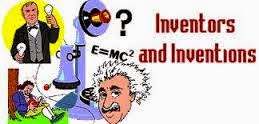
Biographies of Scientists and Inventors
- Alexander Graham Bell – Invented the telephone.
- Rachel Carson – Founder of environmental science.
- George Washington Carver – Botanist who was called the “farmers best friend.”
- Francis Crick and James Watson – Discovered the structure of the DNA molecule.
- Marie Curie – Physicist who discovered radioactivity.
- Leonardo da Vinci – Inventor and artist from the Renaissance.
- Thomas Edison – Invented the light bulb, phonograph, and the motion picture.
- Albert Einstein – Came up with the Theory of Relativity and the equation E=mc2.
- Henry Ford – Invented the Model T Ford, the first mass produced car.
- Ben Franklin – Inventor and Founding Father of the United States.
- Galileo – First used the telescope to view the planets and stars.
- Jane Goodall – Studied chimpanzees in the wild for many years.
- Johannes Gutenberg – Invented the printing press.
- Stephen Hawking – Discovered Hawking Radiation and wrote A Brief History in Time.
- Antoine Lavoisier – Father of modern chemistry.
- Isaac Newton – Discovered the theory of gravity and the three laws of motion.
- Louis Pasteur – Discovered pasteurization, vaccines, and founded the science of germ theory.
- The Wright Brothers – Invented the first airplane.
Must Read: Peoples Who Changed the World
Types of Scientists
- Astronomer – Studies the planets, stars, and galaxies.
- Botanist – Studies plant life.
- Chemist – Studies chemistry and the behavior, properties, and composition of matter.
- Cytologist – Studies cells.
- Ecologist – Studies the relationship between living organisms and the environment.
- Entomologist – Studies insects.
- Geneticist – Studies genes, DNA, and the hereditary characteristics of living organisms.
- Geologist – Studies the properties of matter that makes up Earth as well as the forces that shaped it.
- Marine biologist – Studies the living organisms that live in the ocean and other bodies of water.
- Microbiologist – Studies microscopic life forms such as bacteria and protists.
- Meteorologist – Studies the Earth’s atmosphere including the weather.
- Nuclear physicist – Studies the interactions and make up of the atom.
- Ornithologist – Studies birds.
- Paleontologist – Studies prehistoric life and fossils including dinosaurs.
- Pathologist – Studies diseases caused by pathogens such as bacteria and viruses.
- Seismologist – Studies earthquakes and the movements of the Earth’s crust.
- Zoologist – Studies animals.
Must Read: Computer Devices their Inventors
What is the difference between Scientists and Inventors?
In general terms, a scientist is a person who studies nature and makes theories and discoveries as to how nature works using the scientific method. An inventor takes the laws and theories of science and puts them to practical use by humans. Many people are both scientists and inventors. For example, Isaac Newton was a scientist when he wrote about the theory of gravity, but he was also an inventor when he made the first working reflecting telescope.

